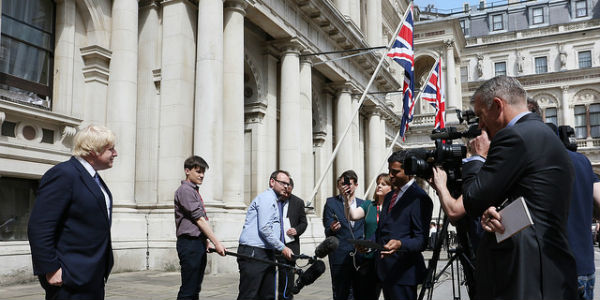From City Hall to Downing Street: what would Boris as Mayor tell us about Boris as PM?
As speculation mounts again about Theresa May’s longevity at Prime Minister, Boris Johnson’s star has risen once again. But what would PM Boris be like? Ben Worthy and Mark Bennister read the runes from his time as London’s Mayor.

Boris Johnson talks to the press. Picture: Foreign and Commonwealth Office, via (CC BY 2.0)
Having spent time in local government can be a bonus to a leader: Prime Ministers as diverse as Clement Attlee and Theresa May have done a stint at local level. We look at how Boris Johnson’s time as Mayor of London suggests what he would be like in Number 10.
Expect eye-catching media events and charisma…
Johnson rose to prominence through the media and was the archetypal ‘everyday’ celebrity politician. As Mayor he was an expert at either creating his own media events (such as joining a drugs raid in 2011) or taking advantage of any that came his way (such as the infamous Olympics zip-wire incident). While no great orator, his jokes and off-colour comments helped shape his image as a jester. His biographer Andrew Gimson speaks of how his political vision was, at best, a brand of ‘Merry England conservatism’, giving him pragmatism and flexibility as Mayor. Though his style was an ‘affront to serious people’s idea of how politics should be conducted’, like other leaders you could name, his ‘genuine bogusness’ held wide appeal, and brazen shamelessness, rather than being an impediment, was the key to his success.
His interventions as Foreign Secretary, a job that requires far more care, vision and diplomacy, have proved to be as disastrous as his Mayoral activities were successful. People have looked to Johnson, as a lead Brexiter in a great office of state, to see how Brexit will shape up, making it a little trickier not to have a vision. We could expect a series of terrible, Trump-esque scenes under Prime Minister Johnson. Johnson adores popularity and heartily dislikes being disliked – not a good set of desires for an office that (almost) inevitably results in disappointment.
…but don’t expect detail
Johnson was the Mayor ‘long on charisma and short on detail’. The secret to his success in London was to delegate to a series of very able chiefs of staff and deputies. He has struggled in the FCO, an office requiring a very firm grasp of details and briefs, with the Nazanin Zaghari-Ratcliffe diplomatic dispute with Iran revealing just how out of his depth he seemed. The key to any Boris premiership would be who is at his shoulder.
Expect quixotic populist projects (that may never arrive)
Johnson’s time as Mayor was filled with populist ideas for grand projects that either didn’t quite prove to be the success they hoped (such as the cable cars) or never came to pass (the ‘Boris Island’, his airport on the Thames). These projects served to gather headlines for Boris and, in the case of Boris Island, side step tricky questions about Heathrow as he searched for a safe seat. Yet London and the taxpayer is still paying the price for a series of expensive and incomplete vanity projects. The introduction of ‘Boris Bikes’ is, of course, a standout policy. It has not, however, been the social leveller he promised and use of the bikes is disproportionately an activity of affluent, white men. Anyone hoping that Prime Minister Johnson will mean a bridge over to France should prepare to be disappointed.
Expect him to take an ‘independent’ line
Perhaps the one area in which Johnson resembles Churchill is his almost perpetual disloyalty to the party line. Though Johnson is ostensibly a Conservative, he repeatedly used the office of Mayor to push against any ‘slavish’ interpretation of government or party policy. He fought robustly government housing policy, policing cutbacks and, most importantly, Conservative EU policy on a referendum.
Even as Foreign Secretary, it seems collective responsibility and non-interference in other ministers’ ‘patches’ doesn’t apply to him and he has formulated his own red lines and ideas on NHS funding. Creating such ‘distance’ from within Downing Street is difficult, as Theresa May has found out. It’s far harder to rebel and push against ‘the official line’ when you are in charge of it. And Boris has few friends and limited numbers of cheerleaders in the Conservative party. Remember how his so-called friend and once-planned running partner Michael Gove stabbed him in the front?
Expect victory?
Johnson’s greatest achievement was winning twice in a Labour city. Perhaps his key selling point was his ‘bridging’ popularity. Boris (like Ken Livingstone before him) had cross-party appeal. His style and charisma made him the Heineken politician, reaching voters no one else could. The past tense is important, as it’s no longer clear he’s still Heineken. In 2017 there were claims he was ‘toxic’, especially in Remain areas. London has clearly fallen out of love with him. Current polls record only a +6 point lead on whether he was a good or bad Mayor (compared with a +20 point lead for his old foe Ken). Even Tory voters are losing faith. Could Boris Johnson still heal the divided country? The numbers on the bus he rode say no, though the Foreign Secretary and his supporters may believe the old magic is still there.
In some senses, Mayor of London was Johnson’s perfect job. He had limited power but a wonderful platform. The fear is that we would get a Prime Minister Johnson full of quixotic projects, tilting at windmills and bringing the country down with him when he falls.
This article represents the views of the authors and not those of Democratic Audit.
See the new article Worthy, B., Bennister, M., & Stafford, M. (2018). ‘Rebels leading London: the mayoralties of Ken Livingstone and Boris Johnson compared’. British Politics.
About the authors
 Ben Worthy is Lecturer in Politics at Birkbeck College, University of London. He is the author of The Politics of Freedom of Information: How and why governments pass laws that threaten their power.
Ben Worthy is Lecturer in Politics at Birkbeck College, University of London. He is the author of The Politics of Freedom of Information: How and why governments pass laws that threaten their power.
 Mark Bennister is Reader in Politics at Canterbury Christ Church University.
Mark Bennister is Reader in Politics at Canterbury Christ Church University.





 Democratic Audit's core funding is provided by the Joseph Rowntree Charitable Trust. Additional funding is provided by the London School of Economics.
Democratic Audit's core funding is provided by the Joseph Rowntree Charitable Trust. Additional funding is provided by the London School of Economics.